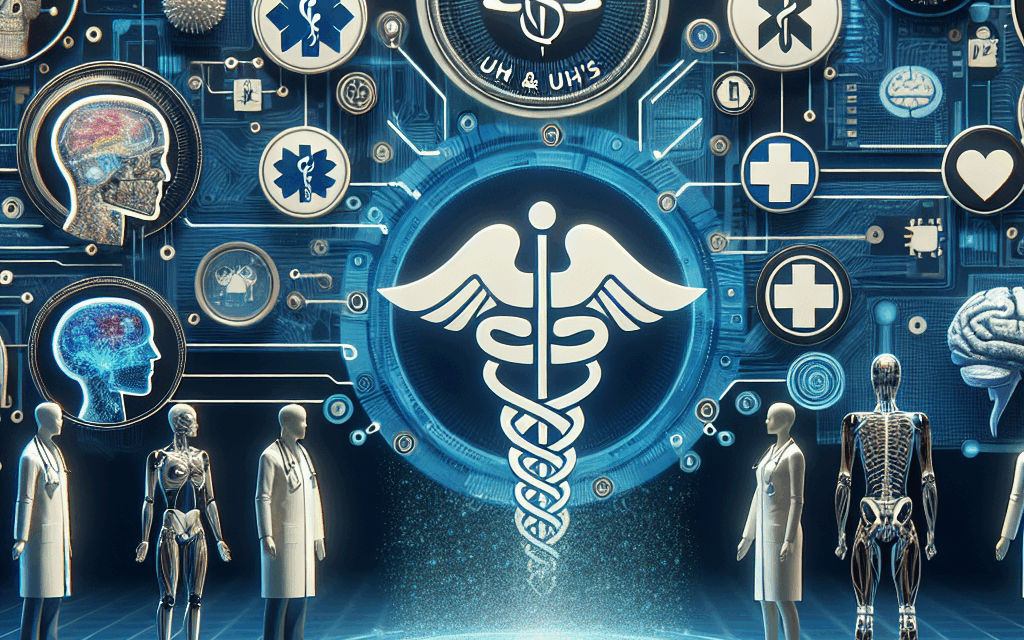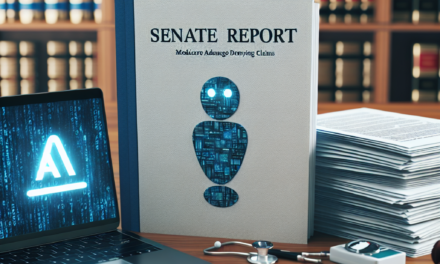UHS Collaborates with Hippocratic AI to Introduce AI Agents
The healthcare industry is undergoing a significant transformation, driven by advancements in technology and artificial intelligence (AI). One of the most notable collaborations in this space is between Universal Health Services (UHS) and Hippocratic AI, aimed at integrating AI agents into healthcare systems. This partnership promises to enhance patient care, streamline operations, and improve overall healthcare delivery. In this article, we will explore the implications of this collaboration, the technology behind AI agents, their potential applications in healthcare, ethical considerations, and future prospects.
Understanding the Collaboration: UHS and Hippocratic AI
Universal Health Services, Inc. (UHS) is one of the largest healthcare management companies in the United States, operating numerous hospitals and outpatient facilities. Hippocratic AI, on the other hand, is a pioneering company focused on developing AI solutions tailored for the healthcare sector. Their collaboration aims to leverage AI technology to improve patient outcomes and operational efficiency.
UHS’s decision to partner with Hippocratic AI stems from a growing recognition of the potential of AI in healthcare. The collaboration is designed to create AI agents that can assist healthcare professionals in various capacities, from administrative tasks to clinical decision-making. This partnership is particularly timely, as the healthcare industry faces increasing pressure to enhance efficiency while maintaining high standards of patient care.
The Goals of the Collaboration
The primary goals of the UHS and Hippocratic AI collaboration include:
- Enhancing Patient Care: By utilizing AI agents, UHS aims to provide more personalized and timely care to patients.
- Streamlining Operations: AI can automate routine tasks, allowing healthcare professionals to focus on more complex patient needs.
- Improving Decision-Making: AI agents can analyze vast amounts of data to support clinical decisions, leading to better patient outcomes.
- Reducing Costs: By increasing efficiency, the collaboration aims to lower operational costs, making healthcare more accessible.
- Driving Innovation: The partnership seeks to foster a culture of innovation within UHS, encouraging the adoption of cutting-edge technologies.
The Technology Behind AI Agents
AI agents are sophisticated software programs designed to perform tasks that typically require human intelligence. They utilize machine learning, natural language processing, and data analytics to interpret and respond to complex queries. Understanding the technology behind these agents is crucial to appreciating their potential impact on healthcare.
Machine Learning and Data Analytics
At the core of AI agents is machine learning, a subset of AI that enables systems to learn from data and improve over time. In healthcare, machine learning algorithms can analyze patient data, identify patterns, and make predictions. For instance, predictive analytics can help identify patients at risk of developing certain conditions, allowing for early intervention.
Data analytics plays a vital role in the functionality of AI agents. By processing large datasets, these agents can provide insights that inform clinical decisions. For example, an AI agent could analyze a patient’s medical history, lab results, and demographic information to recommend personalized treatment options.
Natural Language Processing (NLP)
Natural language processing is another critical component of AI agents. NLP enables machines to understand and interpret human language, making it possible for AI agents to interact with healthcare professionals and patients effectively. This capability is particularly useful in applications such as virtual health assistants, which can answer patient queries and provide information about treatment options.
For example, an AI-powered chatbot could assist patients in scheduling appointments, answering common questions about medications, or providing pre-visit instructions. By streamlining communication, these agents can enhance the patient experience and reduce the administrative burden on healthcare staff.
Integration with Existing Systems
For AI agents to be effective, they must be integrated into existing healthcare systems. This integration involves ensuring that AI tools can communicate with electronic health records (EHRs), billing systems, and other software used by healthcare providers. UHS and Hippocratic AI are working to create seamless interfaces that allow AI agents to access and analyze data from multiple sources.
Successful integration can lead to significant improvements in workflow efficiency. For instance, an AI agent could automatically update patient records after a consultation, reducing the time healthcare professionals spend on documentation. This efficiency not only saves time but also minimizes the risk of errors associated with manual data entry.
Potential Applications of AI Agents in Healthcare
The collaboration between UHS and Hippocratic AI opens up numerous possibilities for the application of AI agents in healthcare. These applications can enhance various aspects of patient care and operational efficiency.
Clinical Decision Support
One of the most promising applications of AI agents is in clinical decision support. By analyzing patient data and medical literature, AI agents can provide healthcare professionals with evidence-based recommendations for diagnosis and treatment. This support can be particularly valuable in complex cases where multiple factors must be considered.
For example, an AI agent could assist a physician in diagnosing a rare condition by cross-referencing the patient’s symptoms with a vast database of medical knowledge. This capability not only aids in accurate diagnosis but also helps in formulating effective treatment plans tailored to individual patients.
Patient Engagement and Education
AI agents can play a crucial role in enhancing patient engagement and education. By providing personalized information and support, these agents can empower patients to take an active role in their healthcare. For instance, an AI-powered mobile app could send reminders for medication adherence, provide educational resources about a patient’s condition, and facilitate communication with healthcare providers.
Research has shown that engaged patients are more likely to adhere to treatment plans and experience better health outcomes. By leveraging AI agents to foster engagement, UHS can improve patient satisfaction and overall health results.
Operational Efficiency and Cost Reduction
AI agents can significantly enhance operational efficiency within healthcare organizations. By automating routine administrative tasks, such as appointment scheduling and billing inquiries, these agents free up valuable time for healthcare professionals. This efficiency can lead to cost reductions, allowing UHS to allocate resources more effectively.
For example, an AI agent could handle patient inquiries about insurance coverage, reducing the workload on administrative staff. This not only improves response times for patients but also allows staff to focus on more complex issues that require human intervention.
Telehealth and Remote Monitoring
The rise of telehealth has been accelerated by the COVID-19 pandemic, and AI agents can enhance this mode of care delivery. By integrating AI into telehealth platforms, UHS can provide patients with virtual consultations that are supported by AI-driven insights. For instance, an AI agent could analyze a patient’s symptoms during a telehealth visit and provide real-time recommendations to the healthcare provider.
Additionally, AI agents can facilitate remote monitoring of patients with chronic conditions. By analyzing data from wearable devices and home monitoring systems, these agents can alert healthcare providers to any concerning changes in a patient’s health status, enabling timely interventions.
Research and Development
AI agents can also contribute to research and development within healthcare organizations. By analyzing large datasets from clinical trials and patient records, these agents can identify trends and correlations that may not be apparent through traditional research methods. This capability can accelerate the development of new treatments and therapies.
For example, an AI agent could analyze data from thousands of patients to identify potential side effects of a new medication, leading to more informed decisions about its safety and efficacy. This application not only enhances patient safety but also contributes to the advancement of medical knowledge.
Ethical Considerations in AI Implementation
While the potential benefits of AI agents in healthcare are significant, ethical considerations must be addressed to ensure responsible implementation. The collaboration between UHS and Hippocratic AI must prioritize ethical standards to build trust among patients and healthcare professionals.
Data Privacy and Security
One of the foremost ethical concerns surrounding AI in healthcare is data privacy and security. AI agents require access to sensitive patient information to function effectively, raising questions about how this data is stored, used, and protected. UHS and Hippocratic AI must implement robust security measures to safeguard patient data and comply with regulations such as the Health Insurance Portability and Accountability Act (HIPAA).
Healthcare organizations must also be transparent about how patient data is used in AI algorithms. Patients should have the right to understand how their information contributes to AI-driven insights and decision-making processes.
Bias and Fairness
Another critical ethical consideration is the potential for bias in AI algorithms. If the data used to train AI agents is not representative of diverse populations, there is a risk that these agents may produce biased recommendations. UHS and Hippocratic AI must prioritize fairness in their AI development processes, ensuring that algorithms are trained on diverse datasets that reflect the demographics of the patient population.
To mitigate bias, ongoing monitoring and evaluation of AI performance are essential. This includes regularly assessing the outcomes of AI-driven decisions to identify any disparities in care delivery.
Informed Consent
Informed consent is a fundamental principle in healthcare, and it extends to the use of AI agents. Patients should be informed about the role of AI in their care and have the opportunity to consent to its use. UHS must develop clear communication strategies to educate patients about how AI agents will be utilized in their treatment and the benefits they may provide.
Additionally, patients should have the option to opt-out of AI-driven processes if they feel uncomfortable with the technology. Respecting patient autonomy is crucial in building trust in AI applications.
Accountability and Transparency
As AI agents become more integrated into healthcare decision-making, questions of accountability arise. If an AI agent makes a recommendation that leads to an adverse outcome, who is responsible? UHS and Hippocratic AI must establish clear guidelines for accountability in AI-driven processes.
Transparency is also vital in fostering trust among patients and healthcare professionals. UHS should provide information about how AI agents operate, the data they use, and the rationale behind their recommendations. This transparency can help demystify AI technology and alleviate concerns about its use in healthcare.
Continuous Monitoring and Improvement
Ethical considerations in AI implementation are not static; they require continuous monitoring and improvement. UHS and Hippocratic AI must commit to ongoing evaluation of their AI agents to ensure they align with ethical standards and best practices. This includes soliciting feedback from healthcare professionals and patients to identify areas for improvement.
By prioritizing ethical considerations, UHS and Hippocratic AI can build a foundation of trust that supports the successful integration of AI agents into healthcare delivery.
Future Prospects of AI Agents in Healthcare
The collaboration between UHS and Hippocratic AI represents a significant step toward the future of healthcare. As AI technology continues to evolve, the potential applications and benefits of AI agents will expand, shaping the landscape of healthcare delivery.
Advancements in AI Technology
The field of AI is rapidly advancing, with ongoing research and development leading to more sophisticated algorithms and tools. Future AI agents may possess enhanced capabilities, such as improved natural language understanding and more accurate predictive analytics. These advancements will enable healthcare organizations to provide even more personalized and effective care.
For instance, future AI agents may be able to analyze genetic data alongside clinical information, leading to more precise treatment recommendations for patients with complex conditions. This integration of genomics and AI has the potential to revolutionize personalized medicine.
Integration with Emerging Technologies
AI agents will likely be integrated with other emerging technologies, such as telemedicine platforms, wearable devices, and blockchain. This integration can create a more holistic approach to patient care, where AI agents work seamlessly with various technologies to enhance the patient experience.
For example, an AI agent could analyze data from a patient’s wearable device in real-time, providing healthcare providers with insights into the patient’s health status during a telehealth consultation. This level of integration can lead to more informed decision-making and improved patient outcomes.
Global Impact on Healthcare Systems
The collaboration between UHS and Hippocratic AI has the potential to influence healthcare systems beyond the United States. As AI technology becomes more accessible, healthcare organizations worldwide may adopt similar approaches to integrate AI agents into their operations. This global impact could lead to improved healthcare delivery in underserved regions and contribute to health equity.
For instance, AI agents could assist healthcare providers in low-resource settings by providing clinical decision support and patient education, ultimately improving health outcomes in these communities.
Shaping the Future Workforce
The integration of AI agents into healthcare will also shape the future workforce. As AI takes on routine tasks, healthcare professionals will have the opportunity to focus on more complex and meaningful aspects of patient care. This shift may require a reevaluation of training and education programs to equip healthcare workers with the skills needed to work alongside AI technology.
Healthcare professionals will need to develop competencies in data interpretation, AI ethics, and technology integration. By embracing these changes, the workforce can adapt to the evolving landscape of healthcare delivery.
Long-Term Sustainability
For the collaboration between UHS and Hippocratic AI to be successful in the long term, it must prioritize sustainability. This includes not only financial sustainability but also the sustainability of ethical practices and patient trust. UHS must continuously evaluate the impact of AI agents on patient care and operational efficiency, making adjustments as needed to ensure positive outcomes.
Moreover, fostering a culture of innovation within UHS will be essential for sustaining the momentum of this collaboration. By encouraging ongoing research and development, UHS can remain at the forefront of AI integration in healthcare.
Conclusion
The collaboration between UHS and Hippocratic AI marks a significant milestone in the integration of AI technology into healthcare. By leveraging AI agents, UHS aims to enhance patient care, streamline operations, and drive innovation within the organization. The technology behind AI agents, including machine learning and natural language processing, holds immense potential for transforming healthcare delivery.
However, ethical considerations must be prioritized to ensure responsible implementation. Data privacy, bias, informed consent, accountability, and continuous monitoring are critical factors that UHS and Hippocratic AI must address as they move forward with their collaboration.
Looking ahead, the future prospects of AI agents in healthcare are promising. Advancements in technology, integration with emerging tools, and a focus on global impact will shape the landscape of healthcare delivery. As UHS and Hippocratic AI continue to innovate, they have the opportunity to set a precedent for the responsible use of AI in healthcare, ultimately improving patient outcomes and enhancing the overall healthcare experience.





